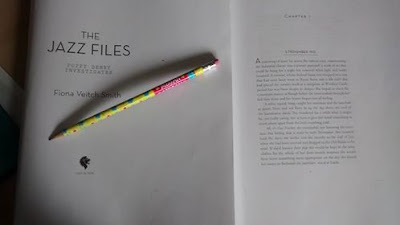Jots and Tittles
 |
| About to start editing the galley proof of The Jazz Files |
I’ve just spent the last ten days reading through the galley
proofs of my soon-to-be-published novel, The
Jazz Files. I was told only to look at factual issues and text that I
wanted to reword - not because it was wrong, but because I might want to rephrase
it. Someone else would be dealing with spelling, grammar and layout issues. I
actually found this very tricky to do – not commenting on errors. To comfort my
inner pedant I put a pencil circle around any ‘typos’ I found but didn’t write
them up into my list of author corrections that I submitted to my publisher.
The thing
is it isn’t my job to point out those errors. If it ends up that the things I
circled for my own records are not corrected, I will be frustrated, but I need
to learn when to speak and when to hold my tongue.
It reminded
me of when I was twelve years old and I publicly corrected my uncle’s grammar.
He was furious with me and told me – publicly – that it was not nice to correct
people like that. In my defence I said: “But it’s wrong.” And I will never
forget his answer: “No pet, what’s wrong is to make people feel you know more
than they do and to show them up in front of folk."
As writers, we are people who
love words and more often than not, the correct use and presentation of those words.
It frustrates us when we see or hear the English language misused. However, we
must be careful that our passion for the language does not come across as
judgmental or unkind; pointing out someone’s poor spelling or grammar – on the
internet or in ‘real life’ – is humiliating.
I was recently the recipient of
this and I thought back to how my uncle must have felt all those years ago. In
this day and age of quick emails / posts / texts, often written on the hoof and
typed on miniscule keyboards and subject to the tyranny of auto-correct,
mistakes are made. But does it really matter? Unless the purpose of the post
was to teach grammar or correct English usage, is it our job to point out
errors? Surely what is more important is successful and gracious communication
between people.
Some people
wear their inner pedant like a badge of honour and think others should be
grateful that they have corrected their sloppy writing. Now don’t get me wrong,
I like a well-written piece of text as much as the next writer, but I need to
remember that speaking the truth in love sometimes means not speaking the
‘truth’ at all.
Fiona Veitch Smith is a writer and writing lecturer,
based in Newcastle upon Tyne . She writes
across all media, for children and adults. Her formerly self-published
children’s books The
Young David Series, are now available from SPCK. Her mystery novel The
Jazz Files, the first in the Poppy Denby Investigates Series (Lion
Fiction), is due out in September 2015. http://fiona.veitchsmith.com

Very well said Fiona. We need to be sensitive to the feelings of others and love rather than condemn. This is true in all areas of life
ReplyDeleteEmpathy is what we need: how does what we say make the other person feel? It's easy to say something and have it taken another way ... then you find you've hurt the other person because of how they understood it. So then, maybe they get mad at you ... or worse, they decide to keep quitet but are filled with resentment/anger/misery ...So many traps!
ReplyDeleteEmpathy is what we need: how does what we say make the other person feel? It's easy to say something and have it taken another way ... then you find you've hurt the other person because of how they understood it. So then, maybe they get mad at you ... or worse, they decide to keep quitet but are filled with resentment/anger/misery ...So many traps!
ReplyDeleteYou are right, of course, Fiona. I am one of those pernicious pedants. But if we don't correct people, they will continue in the wrong usage, and the language will deteriorate. For this reason I feel bound to point out that it's 'minuscule' (meaning 'without a tail') not 'miniscule'! Sorry...
ReplyDelete